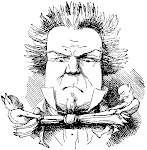A brevity:
Has anyone noted the number of times Key, under the influence of his minders, used the verb "struggling" in his recent press releases. Along with the concept of the "strugglers" we have a key example of weaselly word use in national party speeches.
The blatant attempt to identify with those they have traditionally spurned, through the use of emotively loaded terms, is obvious.
On the same issue I wonder if Fran O'Sullivan actually asked John to explain what he actually meant in his sound bite statement: "When householders are struggling to pay the weekly bills. Helen Clark's decision to spend the thick end of a billion dollars to buy back the rail rolling stock does not make sense."
Does he mean that the Government should not invest in the development and enhancement of the country's infrastructure or does he mean that the Government should not use its reserves to the advantage of the people or does he mean that the government should pay everyone less than the price of a chewing gum pack immediately?
What ever he means it becomes obvious he has little grasp of wise investment policies.
Then, again perhaps we should ask why he has adopted the policy of increasing state aid to private schools when those who actively support private schools are so adamantly opposed to social welfare? Surely increasing the State's contribution to Private Schools amounts to making these same people welfare dependent?
Oh well hypocrisy is such a shallow thing when it comes to poll driven policy creation.
5 May 2008
The evidence for Engkeylish use
Subscribe to:
Post Comments (Atom)

2 comments:
A google search of the National website reveals 100 uses of the word struggling.
A google search of the Labour website reveals 173 uses of the word struggling.
Please explain.
I'm pleased to see that you are searching websites however my argument is that the erstwhile Tory spokespersons who are pretenders to leadership are deliberately using the code words to position themselves as "champions of the people" which is, to anyone with a long memory, patently incorrect.
Post a Comment